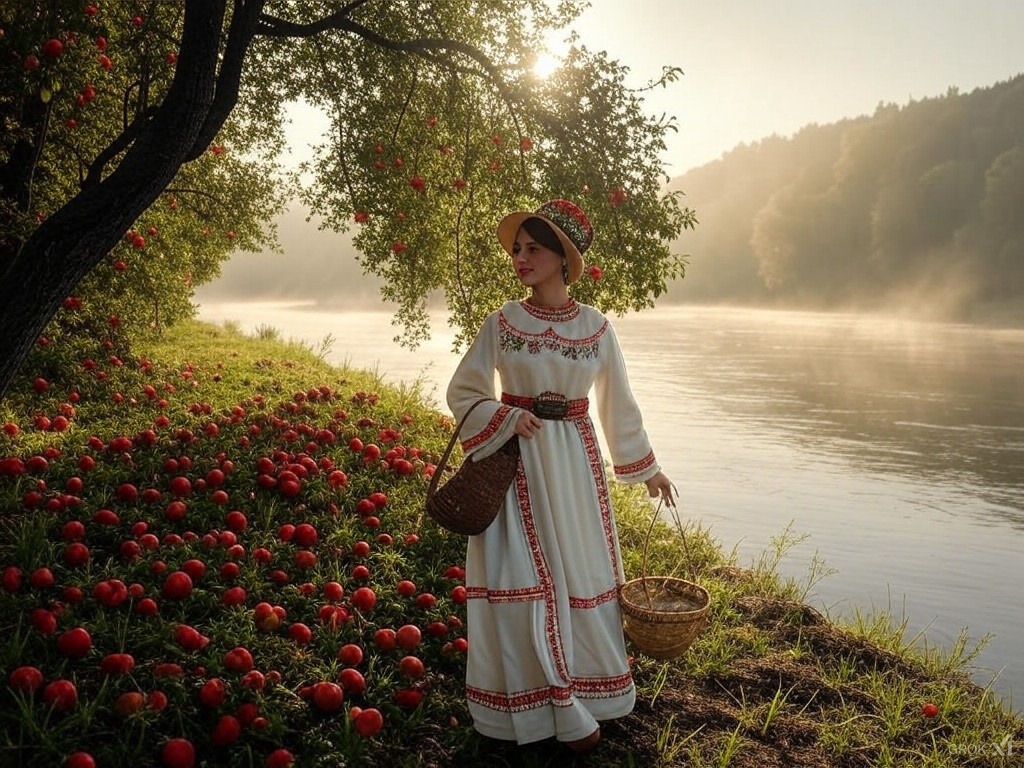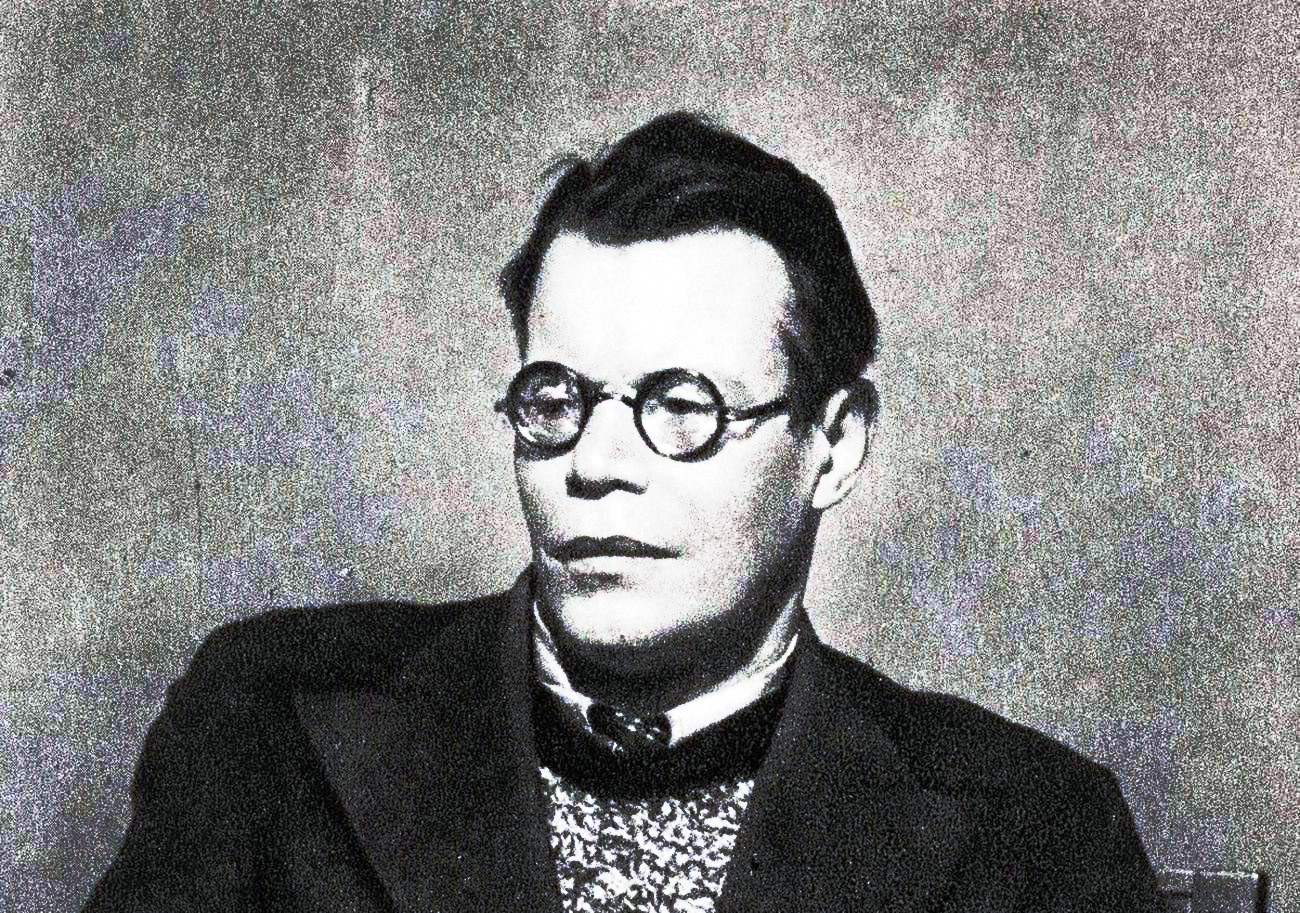Katyusha

Katyusha was written by Mikhail Isakovsky in Russian originally in 1938.
Understand
"Катюша" is a Soviet song from World War II.
It tells of a young girl named Katya (or Katюша) who stands on the bank of a river and sings about her love, a soldier who is far away, defending the homeland.
Through her song, she sends him a message of love and hope, asking him to remember her and protect her homeland, while she guards her love for him.
The lyrics reflect patriotism, nostalgia, and devotion.
Text
Each sentence has all the information needed to fully understand it, with each color showing a specific aspect:
- Translation
- Sentence in English.
- Original Sentence
- Sentence in Russian.
- Words sequence
- Each word meaning and origin.
1/12
Mikhail Isakovsky - Katyusha 1938
2/12
Apple and pear trees blossomed, fog floated over the river.
Расцветали яблони и груши, поплыли туманы над рекой.
3/12
Katyusha came ashore, onto a high bank on a steep one.
4/12
She came and started a song about the steppe gray eagle.
Выходила, песню заводила про степного сизого орла.
5/12
About the one she loved, about the one whose letters she treasured.
6/12
Oh, song, maiden song, you fly after the clear sun:
Ой, ты песня, песенка девичья, ты лети за ясным солнцем вслед.
7/12
And say hello to the fighter on the far border from Katyusha.
И бойцу на дальнем пограничье от Катюши передай привет.
и
And - coordinating conjunction
на
on - adposition
дальнем
пограничье
border guards - noun
от
- adposition
привет
Hello - noun
.
8/12
Let him remember a simple girl, let him hear her sing, let him take care of his native land, and let Katyusha save his love.
9/12
let him take care of his native land, and let Katyusha save his love.
10/12
Apple and pear trees blossomed, fog floated over the river.
Расцветали яблони и груши, поплыли туманы над рекой.
11/12
Katyusha came ashore, onto a high bank on a steep one.
12/12
Katyusha came ashore, onto a high bank on a steep one.

Mikhail Isakovsky
Russian Empire 1900 - Soviet Union 1973
Soviet author, known as Михаи́л Васи́льевич Исако́вский
Themes and Interpretation
Love and Longing
At its core, "Katyusha" is a love song. It speaks of a young woman named Katyusha who expresses her love and longing for her beloved, a soldier who is far away.
Patriotism and War
The song is set against the backdrop of war, symbolizing the personal sacrifices made by individuals during times of conflict. Katyusha's love story is intertwined with the broader theme of patriotism, as her beloved fights for the motherland.
Hope and Resilience
Despite the separation caused by war, the song conveys a sense of hope and resilience. Katyusha's steadfastness in her love represents the enduring spirit of those left behind, waiting for their loved ones.
Nature and Landscape
The song often references the Russian landscape, with mentions of the Volga River and the steppe, tying the personal narrative to the vastness and beauty of Russia, enhancing the sense of national identity.
Cultural Identity
"Katyusha" is emblematic of Russian cultural identity, often evoking images of traditional Russian life, with its mention of folk elements like the balalaika and traditional attire, which resonates with Russian audiences.
Feminine Strength
Katyusha herself is portrayed as a strong character, embodying the strength and patience of Russian women during wartime, supporting the narrative of women's roles in national history.
Nostalgia
The song evokes a sense of nostalgia, not just for personal love but for a simpler, more unified time in Russian history, often looking back to the era of World War II when the song gained immense popularity.
Universal Themes of Separation
While deeply rooted in Russian culture, the themes of separation due to war, love, and longing are universal, allowing "Katyusha" to resonate with audiences beyond Russia.
Symbol of Unity
Over time, "Katyusha" has become a symbol of unity, representing the collective spirit of the Russian people during tough times, particularly during the Great Patriotic War (WWII).
Folk Tradition
The song is a part of the rich tradition of Russian folk music, where storytelling through song was a common way to pass down cultural values, history, and emotions.
Summary
These themes combine to make "Katyusha" not just a love song, but a piece of cultural heritage that reflects broader societal values and historical moments.